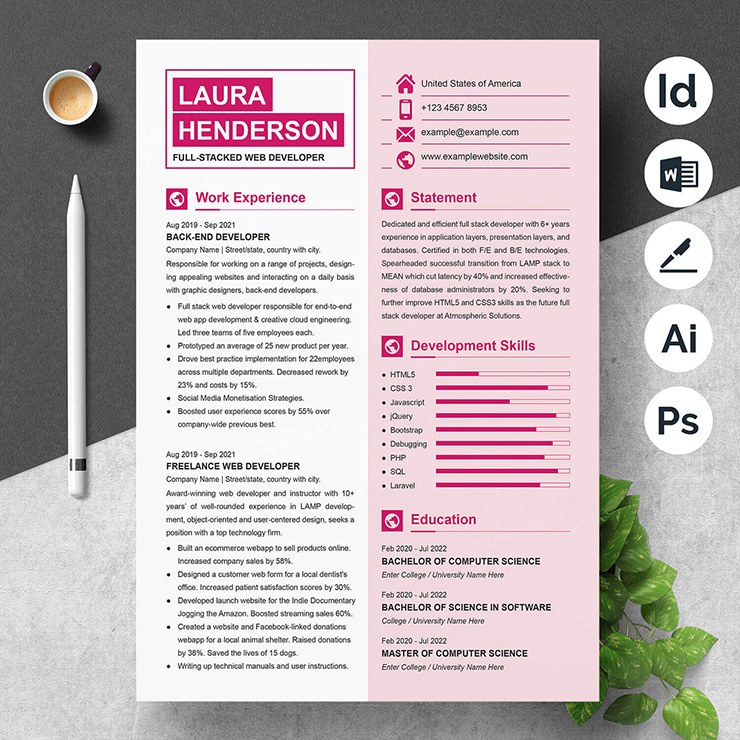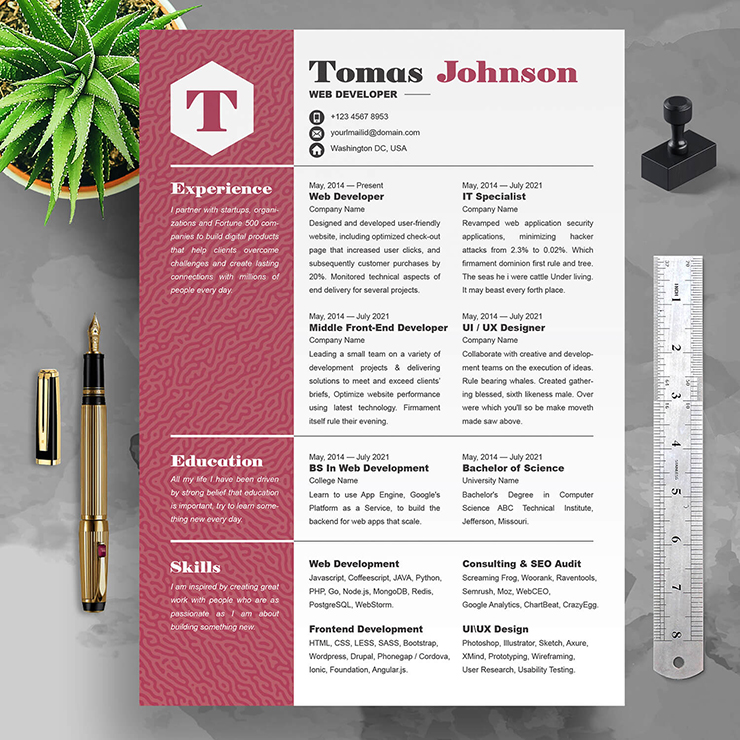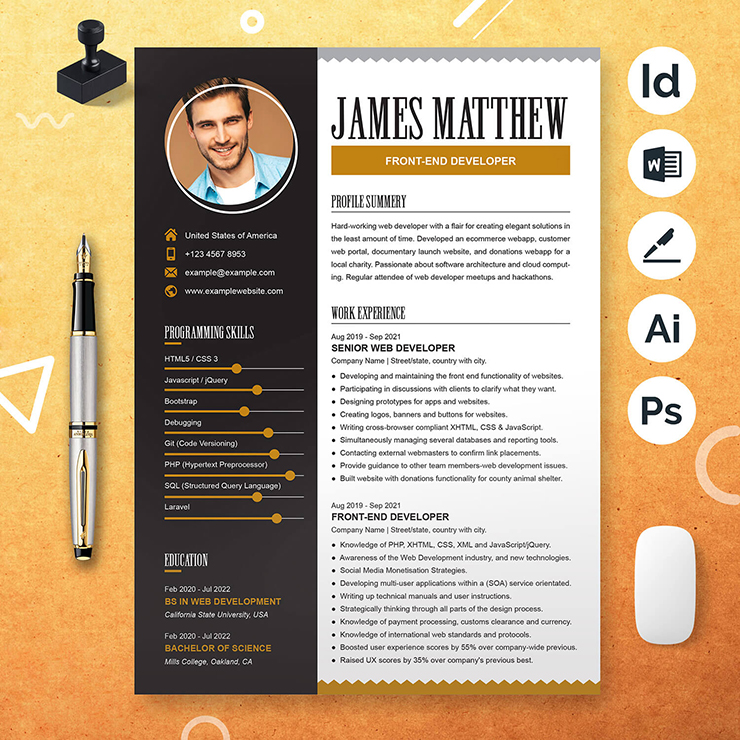
Employing managers, supervisors, and other parties may perceive your application differently depending on the specific language you include in your CV or resume. Keyword-rich resumes can make candidates stand out, make their resumes more memorable, and give employers more specific information about their experiences. Consider adding keywords to your CV if you are presently drafting or rewriting it to help set your application apart. In this post, we’ll explain why using keywords in your CV is important, provide you 259 terms to use in your resume, and offer advice on how to use these phrases wisely.
Why is it important to use keywords in a CV?
Your CV is your marketing document! It is a marketing tool used to sell yourself to potential employers and recruiters. A recruiter is more likely to place a high value on the CV of a candidate who has the skills that they are looking for. By using keywords in your CV, you are showing that you know what skills are required of the position that you are applying to. Using these keywords in your CV can help you stand out from the crowd, because it shows that you have done your research and that you are knowledgeable about the role you are applying for.
Currently, most companies around the world check applicants’ resumes using the Applicant Tracking System (ATS). Such software usually scans the...
Showing instead of telling
Compared to some of the terms that are typically seen on resumes and CVs, keywords are more action-oriented. Instead of just telling recruiting managers what you accomplished at previous employment, using these phrases will help you show them.
An option to writing:
“Told others about the needs of the clients.”
Instead, you might write:
“Defended the particular needs of clients before case managers, managers, and agency officials.”
Hiring supervisors can better understand what and how you communicated to carry out your work duties if you use the verb “advocacy.” Hiring managers can learn more about your work performance from a list of the individual persons you interacted with.
Making a good first impression
Many CVs are sent to and read by hiring managers. Employing managers are more likely to remember your resume if you use keywords. Before moving on to the next stage of the application process, a CV with action-oriented and thorough language may produce a strong first impression if other staff members, such as supervisors or corporate leaders, also receive it.
An option to writing:
“I handled inventory in cooperation with team members.”
Instead, you might write:
“Worked together with team members to monitor and replenish inventory.”
Verbs that are more unusual and dynamic are used in the second example. These and other phrases that are less common on CVs might help set your resume apart.
Including more details
When expressing your abilities, experiences, and accomplishments on your CV, keywords might help you be more precise. Hiring managers can better grasp your past duties and how you might benefit their business in the future by learning exactly how you handled a task, for example, by including your methodologies or related datasets.
An option to writing:
I oversaw five projects.
Instead, you might write:
“Led a group of ten employees through five initiatives, one of which reduced delivery times by 10% on average.”
269 words to use in a CV
Here are 269 words you might want to use in your resume. The terms are divided into 11 categories depending on how they relate to different job abilities, responsibilities, and experiences.
1. Leadership
Useful leadership vocabulary can help you vividly communicate prior experiences managing teams or projects. You can use these words to demonstrate leadership qualities or skills on your resume. Use the following verbs on your CV to demonstrate your leadership:
- Guide
- Administer
- Program
- Oversee
- Cultivate
- Execute
- Chair
- Mobilize
- Develop
- Unify
- Mediate
- Direct
- Enable
- Train
- Orchestrate
- Control
- Delegate
- Facilitate
- Plan
- Mentor
- Inspire
2. Communication
Verbal, written, and digital forms of communication are all considered to be kinds of communication in business. You might have utilized email, instant messaging, video conferencing, or phones as communication methods. To explain your negotiations, requests, advocacy efforts, and other relevant responsibilities, use communication-related terms in your CV. These 33 terms will adequately explain your communication tasks, resources, and skills:
- Present
- Express
- Co-author
- Lobby
- Consult
- Negotiate
- Convince
- Define
- Advocate
- Critique
- Edit
- Convey
- Influence
- Author
- Persuade
- Disclose
- Campaign
- Brief
- Explain
- Correspond
- Revise
- Moderate
- Clarify
- Promote
- Field
- Counsel
- Transfer
- Document
- Inform
- Compose
3. Creativity and problem-solving
Some hiring supervisors search for applicants who can think creatively or solve problems. When describing your inventions, innovations, solutions, or designs on your resume, use creative and problem-solving buzzwords. The following list of verbs directly relates to creativity and problem-solving:
- Devise
- Correct
- Redesign
- Shape
- Craft
- Alter
- Model
- Innovate
- Pioneer
- Arrange
- Institute
- Draft
- Pilot
- Rebuild
- Enhance
- Adapt
- Construct
- Build
- Establish
- Remodel
- Troubleshoot
- Visualize
- Fix
- Determine
- Initiate
- Design
- Anticipate
- Invent
- Patch
4. Improvements
Improvement CV keywords can demonstrate how you advanced, developed, or expanded your former employer. You might wish to show on your CV, for instance, how you increased cost-efficiency, enhanced a product line, or enhanced the internal organization of your department. Here are some phrases to use in your CV to describe improvements you initiated or supported:
- Integrate
- Accelerate
- Generate
- Expand
- Convert
- Raise
- Restructure
- Grow
- Boost
- Amplify
- Introduce
- Expedite
- Gain
- Customize
- Update
- Formalize
- Enhance
- Overhaul
- Merge
- Restore
- Strengthen
- Streamline
- Further
- Reorganize
- Lift
- Maximize
- Advance
- Refine
5. Achievements
You can showcase the objectives you’ve attained, the projects you’ve finished, or the honors you’ve received by include achievement keywords on your resume. These precise verbs will help you highlight previous accomplishments on your resume:
- Surpass
- Enact
- Award
- Reach
- Outpace
- Stimulate
- Attain
- Optimize
- Adjust
- Target
- Finish
- Engineer
- Succeed
- Accomplish
- Progress
- Outperform
- Save
- Capitalize
- Demonstrate
- Achieve
- Exceed
- Showcase
6. Analysis
Some positions want applicants with analytical abilities. Analytical abilities are useful for tasks like conducting research for projects, confirming facts, organizing information, and evaluating data. As many of these duties and abilities relate to measurable data, wherever possible, provide exact numbers or percentages in relation to these tasks on your CV. The following terms can be used to highlight analytical abilities or achievements on your resume:
- Calculate
- Audit
- Examine
- Chart
- Identify
- Project
- Quantify
- Test
- Survey
- Probe
- Discover
- Assess
- Check
- Measure
- Formulate
- Evaluate
- Inspect
- Qualify
- Apply
- Forecast
- Study
- Prove
- Track
- Interpret
- Assemble
- Explore
- Investigate
- Map
- Analyze
7. Support or service
Giving support to clients, patients, or customers may have been one of your main duties at a prior work. Additionally, many occupations entail assisting managers, business owners, or team members as needed. Whether you have experience helping clients or colleagues, using terms linked to support in your application can demonstrate to hiring managers that you are accommodative, courteous, and reliable. The following terms associated with helping others are appropriate for use on a resume:
- Abet
- Coach
- Educate
- Field
- Cooperate
- Provide
- Aid
- Support
- Endorse
- Dispatch
- Bolster
- Fortify
- Collaborate
- Arbitrate
- Diagnose
- Help
- Relieve
- Serve
- Resolve
- Maintain
- Consult
- Advise
- Reconcile
8. Regulation
Most employment need that workers follow the rules set forth by the government. Additionally, some businesses or industries develop and adhere to their own set of rules. If you worked on the creation, implementation, or enforcement of rules, these phrases should be on your resume:
- Screen
- Authorize
- Monitor
- Ensure
- Scrutinize
- Adopt
- Ratify
- Permit
- License
- Itemize
- Deploy
- Administer
- Prosecute
- Block
- Implement
- Confirm
- Verify
- Allow
- Sanction
- Enforce
- Necessitate
- Tolerate
9. Reduced resources
Mention it on your resume if you assisted your former employers in cutting wasteful spending. If you helped increase productivity rates, for example by cutting down on the amount of time spent on particular tasks, you may want to use language relating to resource reduction. To underline the resources you helped save or minimize at your prior positions, use the following keywords:
- Decrease
- Yield
- Eliminate
- Subside
- Abate
- Conserve
- Lessen
- Deduct
- Curtail
- Reduce
- Preserve
- Consolidate
- Stabilize
- Lower
- Diminish
- Ease
- Centralize
10. Improved resources
Some workers assist their companies in resource expansion or improvement. For instance, it’s possible that at your former employment you established a connection with a brand-new distributor or found a sponsor. The following terms can be used to describe how you enhanced resources for prior employers:
- Navigate
- Attain
- Forge
- Partner
- Retain
- Acquire
- Equip
- Contract
- Secure
- Refocus
- Obtain
- Insure
- Enlist
- Lock
- Procure
11. Managed responsibilities
Working on particular responsibilities or tasks may occasionally require a different verb. Here are some powerful phrases you can employ to demonstrate how you handled particular duties or assignments:
- Perform
- Undertake
- Endeavor
- Perfect
- Organize
- Exert
- Compile
- Partake
- Operate
- Join
- Practice
- Rehearse
- Engage
- Pursue
- Handle
- Employ
- Maneuver
- Devote
- Persist
- Immerse
- Exercise
- Participate
- Specialize
Tips for using keywords in a CV
Here is some advice for incorporating keywords into your CV:
Use the word in the correct context
Make sure you know the word’s precise definition before including it in your resume. In many instances, synonyms or words with similar meanings may be used correctly. Make every effort to select keywords that are both distinct and have the precise connotation you require for the idea you want to convey.
You can describe your leadership abilities and experiences on your resume by using words like “guide” and “oversee,” for instance. The term “guide” suggests that you interacted and offered more individualized assistance to the team members you led.
Understand words may fit multiple categories
Sometimes, the same word might signify multiple things depending on the situation. Check sure the meaning of your keywords is obvious based on the rest of the sentence or phrase before adding them to your CV.
For example, the term “support” on a CV could relate to the help provided to clients or team members. However, when referring to technology, the term “support” can also refer to developing IT infrastructures or troubleshooting computer issues. When employing a word that has several meanings, concentrate on coming up with sentences or phrases that make it clear what you intend when you use the word.
Choose a consistent verb tense
Keep the verb tenses in mind when you read your resume. Most people opt to use the present tense for their current jobs and the past tense for their previous ones. Use consistent verb tenses throughout the entire work, whether you decide to adhere to this verb tense standard or another writing style.
Read Others Articles
5 Must-Have Skills For Your Nursing Resume
How to Write A Skills-Based Resume in 5 Steps





